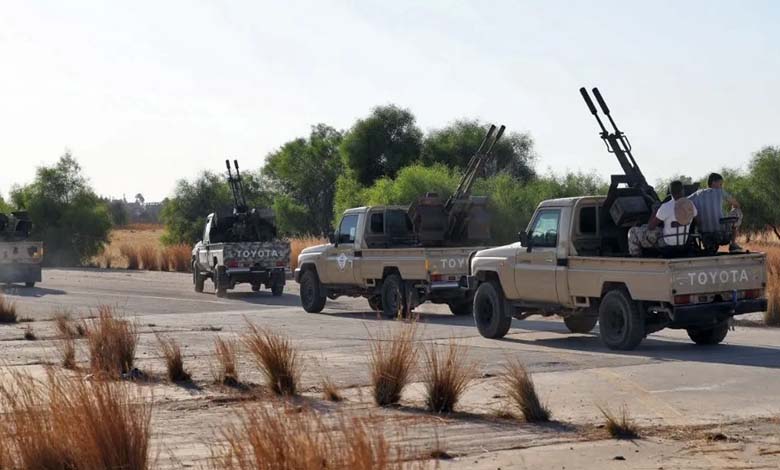Tripoli on the verge of a new confrontation amid military movements

The new wave of military tension is believed to be an attempt by forces allied with Prime Minister Abdelhamid Dbeibah to escalate the situation in order to obstruct U.N. efforts to hold elections.
Events are accelerating in western Libya against the backdrop of an unprecedented security escalation, with the massive deployment of armed groups and field movements reminiscent of the cycles of internal warfare that the capital has endured repeatedly. The city of Zawiya, west of Tripoli, witnessed bloody clashes between armed factions that left several dead and wounded, while attention now shifts to ongoing mobilizations that could pave the way for a broader battle in the heart of Tripoli.
-
Renewed Military Buildup in Tripoli Raises Fears of New Clashes
-
Violence erupts in Tripoli after protesters opposing Dbeibeh are dispersed
Field sources confirmed that Zawiya experienced a violent night on Wednesday, as two armed groups fought with heavy and medium weapons in residential neighborhoods, killing four people and injuring more than ten. Despite attempts at mediation, the city remains tense, with no effective intervention from the authorities, who have failed to impose control over Zawiya for years.
According to the same sources, the armed conflict stemmed from old rivalries between the two groups, reignited by a dispute over a stolen vehicle. Although the immediate cause may seem trivial, observers argue that the confrontation exposes the complexity of the security landscape and underscores the fragility of governmental control in western Libya.
-
UN and Regional Efforts to Contain Tensions in Tripoli
-
The Smoke of Tripoli Clashes Still Rises: Political Economic and Security Repercussions
In Tripoli, recent hours have seen unusual military movements alongside closed security meetings, most notably a gathering held by National Security Advisor Ibrahim Dbeibah, nephew of the Prime Minister, with militia leaders from western Libya in the Andalus neighborhood. The meeting focused on preparations for a possible confrontation aimed at curbing opponents of the caretaker government.
Ibrahim Dbeibah reportedly confirmed that armed groups from Misrata were ready to join any upcoming battle in order to block what he described as a U.N. attempt to impose a political roadmap that does not align with the interests of the “current authority,” referring directly to the plan recently presented to the Security Council by U.N. envoy Hanna Tetteh.
-
Gheniwa’s Blood Strangles Dbeibah… Tripoli’s Nero Burns in His Own Fire
-
Militia Arms Chaos Reignites Violence Spiral in Tripoli
According to leaks, the Tripoli-based government views the U.N. initiative as a direct threat to its survival and is seeking to secure its positions through preemptive military measures.
On the ground, military convoys were spotted moving between Misrata and Tripoli, fueling speculation about preparations for a broader offensive. Reports also indicated that Misrata’s joint force attacked the headquarters of the 166th Brigade, under the General Staff and tasked with conflict mediation, seizing several military vehicles.
-
Heavy Clashes in Tripoli After the Killing of a Militia Leader Affiliated with the Presidential Council
-
Armed Clashes in Tripoli Reveal Fragility of Security Situation
The brigade’s commander, Mohamed al-Hassan, threatened to withdraw from the capital if the equipment was not returned. His forces later redeployed to their positions in an effort to contain escalation, reaffirming that their mission was limited to protecting civilians and preventing a new outbreak of violence.
In a related development, sources revealed that Prime Minister Abdelhamid Dbeibah issued a final ultimatum to the Special Deterrence Force to evacuate Mitiga Airport and release detainees accused of terrorism, signaling a genuine intent to escalate if his demands are not met.
-
Washington Denies Training Armed Groups in Tripoli under Agreement with Dbeibeh
-
Clashes Between Militias in Tripoli Mar Eid Atmosphere
Reactions to these developments were swift. Several local leaders expressed concern about the country sliding back into internal conflict. Osama Juwaili, commander of the western military region, stated that any armed move within Tripoli would undermine political settlement efforts and plunge the capital into further chaos.
Similarly, the Social Council of Souq al-Juma called for de-escalation, warning that renewed use of arms would derail the U.N. roadmap, which aims to form a unified government and prepare for national elections to end division. Hisham Ben Youssef, the council’s coordinator, stressed their full support for the U.N.-led process, convinced that political compromise is the only path to sparing Libyans more bloodshed and collapse.
-
Complications Hindering the Evacuation of Militias from Tripoli
-
Analyst Reveals the Beneficiary Behind the Clashes in Tripoli
Beyond the military arena, tensions also rose on the political front. The Souq al-Juma community movement accused the Dbeibah government and State Minister for Communication Walid al-Lafi of attempting to interfere with the results of municipal elections after lists affiliated with the government lost.
In an angry statement, they denounced the legal appeals as an effort to confuse matters and undermine voters’ will, affirming that they would not allow a “political coup” against the ballot box, which they saw as proof of the current government’s failure to gain genuine popular legitimacy.
Given these fast-paced developments, observers do not rule out that Tripoli may soon face a new armed confrontation if international actors fail to press for de-escalation. In a country already lacking unified institutions and a professional army, any slide into fresh conflict could destroy what little stability remains and return Libya to years of bloodshed and division.












